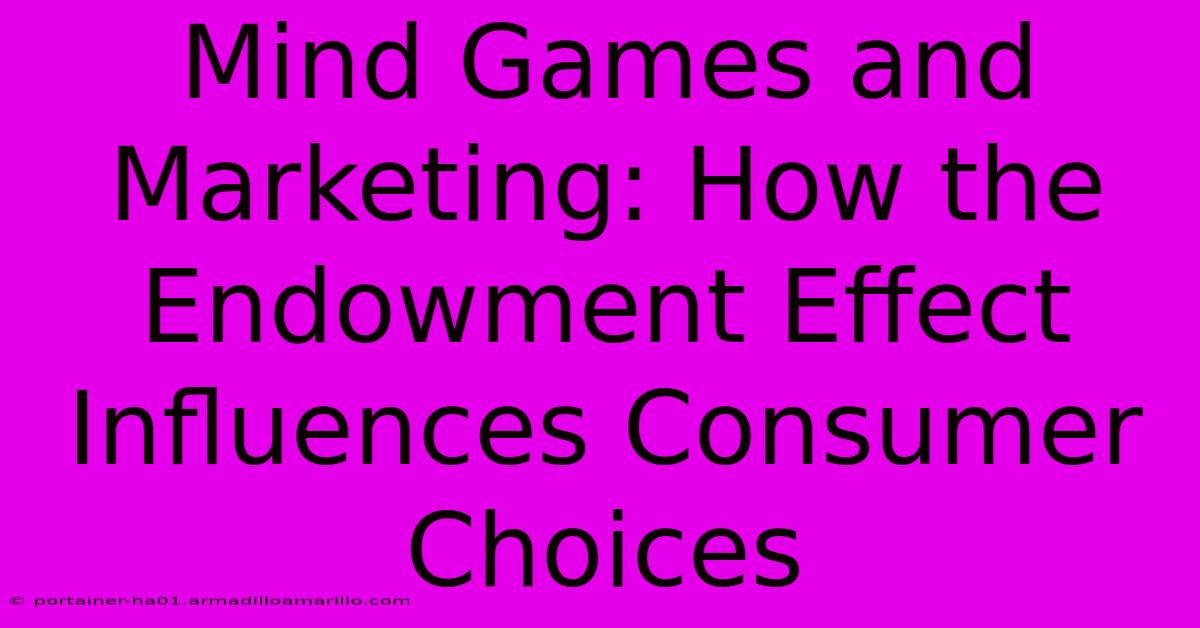Mind Games And Marketing: How The Endowment Effect Influences Consumer Choices

Table of Contents
Mind Games and Marketing: How the Endowment Effect Influences Consumer Choices
The world of marketing is a fascinating battleground of psychology and persuasion. Marketers constantly seek ways to understand and influence consumer behavior, and one powerful tool in their arsenal is the understanding of cognitive biases. Among these, the endowment effect plays a significant, often subconscious, role in shaping consumer choices. Understanding this effect is crucial for marketers aiming to boost sales and build brand loyalty.
What is the Endowment Effect?
The endowment effect, also known as the mere ownership effect, describes the psychological phenomenon where people place a higher value on things they own or possess, simply because they own them. This inflated valuation applies even if the item was acquired only recently or at little cost. Essentially, the act of possessing something makes it seem more valuable to the possessor than it might to someone else.
Think about it: you might be willing to pay $20 for a coffee mug at a store, but you might demand $40 or more to sell a similar mug you already own. The perceived value shifts simply because you now possess it. This seemingly irrational behavior stems from our inherent loss aversion – we feel the pain of loss more acutely than the pleasure of an equivalent gain.
The Psychology Behind It
The endowment effect isn't just about simple attachment. Several psychological factors contribute:
- Loss Aversion: As mentioned, this is a key driver. We are naturally wired to avoid losses more than we seek gains. Giving up something we own feels like a loss, prompting us to demand a higher price to compensate.
- Cognitive Dissonance: Selling something we own can create internal conflict or dissonance. We justify our initial purchase decision by valuing the item higher, making it harder to let go at a perceived loss.
- Emotional Attachment: Even with inanimate objects, we often develop emotional connections. These bonds further inflate our perceived value and make us reluctant to part with them.
How Marketers Leverage the Endowment Effect
Understanding the endowment effect allows savvy marketers to influence consumer behavior in several creative ways:
1. Free Trials and Samples:
Offering free trials or samples leverages the endowment effect brilliantly. Once consumers experience a product, even for a short time, they develop a sense of ownership, making them more likely to purchase it afterward. This is why free trials are so effective for software, subscription services, and even physical goods.
2. Creating a Sense of Ownership:
Techniques like personalization (e.g., addressing customers by name), customized recommendations, and even allowing customers to design their own products foster a sense of ownership and increase perceived value. The feeling of co-creation boosts attachment and lowers the perceived risk of purchase.
3. Limited-Time Offers and Scarcity:
Creating a sense of scarcity emphasizes the potential loss of not owning the product. Limited-time offers tap into our fear of missing out (FOMO) and, in conjunction with the endowment effect, increase the perceived value and urgency to buy.
4. Money-Back Guarantees:
A seemingly contradictory tactic, money-back guarantees actually reinforce the endowment effect. By minimizing the risk of loss, they encourage consumers to try the product, fostering that sense of ownership and subsequently increasing the likelihood of keeping it.
The Endowment Effect in Action: Examples
Consider these examples of the endowment effect in action:
- Real Estate: Homeowners often overestimate the value of their homes, driven by their emotional attachment and sense of ownership.
- Collecting: Collectors often value their items far beyond their market price, influenced by the emotional connection and perceived rarity.
- Personalized Gifts: A personalized gift feels more valuable than a generic one due to the increased sense of ownership and personal connection.
Conclusion: Understanding the Power of Possession
The endowment effect is a potent psychological force that significantly impacts consumer decision-making. By understanding its nuances, marketers can craft more effective strategies to influence purchase behavior, increase customer loyalty, and ultimately, drive sales. Recognizing the power of possession is key to unlocking the potential of persuasive marketing. Ignoring this bias, however, could mean missing out on significant opportunities for growth.

Thank you for visiting our website wich cover about Mind Games And Marketing: How The Endowment Effect Influences Consumer Choices. We hope the information provided has been useful to you. Feel free to contact us if you have any questions or need further assistance. See you next time and dont miss to bookmark.
Featured Posts
-
Discover The Hidden Gem How Transition Images Can Boost Your Email Marketing
Feb 07, 2025
-
Say Goodbye To Boring Nails Daisy Dnd Gel Polish Set Will Leave You Spellbound
Feb 07, 2025
-
Elevate Your Kitchen The Secret Weapon Of Interior Designers Revealed
Feb 07, 2025
-
Burgundys Boldness Unleash The Powerful Charm Of A Deep Winey Purple
Feb 07, 2025
-
Between The Lines And Laughing Out Loud Fantasy League Names That Will Ignite Your Funny Bone
Feb 07, 2025
